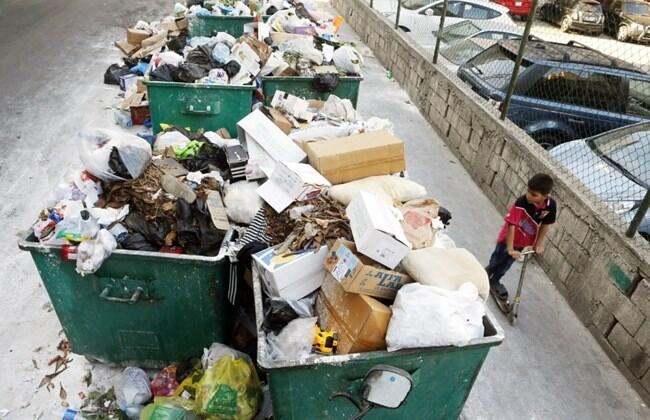Sukleen has been unable to dispose of waste after the Environment Ministry closed the overfilled Naameh landfill last Friday. The company said it was waiting for the state to identify new disposal grounds and the Environment Ministry has yet to propose a feasible alternative. Environment Minister Mohammad Machnouksaid he would raise the matter again at Thursday’s Cabinet session. The glaring sun showed no pity toward residents, who can now count down the days, if not hours, until the streets reek as they did for a week last year when demonstrators blocked Sukleen trucks from reaching Naameh. Chouf area residents are out again in front of the landfill to make certain it does not open again. They vowed not to leave until they see legal certification of its retirement. The Cabinet twice postponed closing Naameh in the past 18 months until Machnouk, at the last minute, honored the final deadline of July 17. With its closure, Machnouk asked municipalities to dispose of their own waste, instead. Few could locate suitable grounds, and Sukleen stopped collecting Sunday, saying its on-site premises had filled up with accumulated trash. Each municipality has responded differently to the crisis. Jdeideh officials say they are helpless. “We don’t have a solution for Jdeideh,” said municipality chief, Baheej al-Futayri, noting that it does not employ garbage collectors. “People already take the municipality’s money to collect trash so let them do it,” Futayri said, alluding to the maligned Independent Municipal Fund, the pot of money the state distributes to municipalities, but which also pays Sukleen, draining municipalities of 40 percent of their budgets, according to independent research and consultancy firm Information International. The municipality of Burj Hammoud is collecting garbage in its own trucks in Sukleen’s absence and dumping it in a vacant lot by the sea, Mayor Antranik Meserlian said. “We can bear this for one week, at most, before the lot fills up,” he said. In fact, today’s crisis can be traced back to Burj Hammoud 18 years ago, when the municipality forced the government to close the putrid, overfilled landfill there; as part of the emergency plan to replace it in 1998, the Cabinet opened Naameh. Meserlian said the Burj Hammoud fill remains closed and the municipality is provisionally dumping waste elsewhere. Beirut Mayor Bilal Hamad told The Daily Star that the Environment Ministry and Council for Development and Reconstruction were working to develop a solution to dispose the capital’s trash. The Environment Ministry had no comment. Machnouk proposed last week that Sukleen divert Naameh-bound waste to other dumps around the country instead. A leaked Environment Ministry document dated July 6 identified eight sites; three so far have announced their absolute refusal to accept the capital region’s trash. A broad coalition of Sidon representations said the city’s waste treatment facility could not handle any additional burden. “I’ve given the environment minister my personal refusal and the refusal of the municipal council and of MPs Fouad Siniora and Bahia Hariri to accept any waste from outside Sidon,” Mayor Mohammad Saudisaid. Machnouk has requested that the waste treatment center treat 150 tons of wastes that used to be dumped in Naameh. Al-Jamaa al-Islamiya in Sidon and the Popular Nasserite Organization also refused Machnouk’s proposal. “The waste sorting facility on Sidon’s southern shore cannot absorb any more garbage. It does not even treat half of Sidon’s waste, and trucks dump the other half on the sea basin,” said former MP Osama Saad, general secretary of the PNO. Beirut MP Mohammad Qabbani castigated other cities for refusing the capital’s waste, saying it pointed to the nation’s fracture. “Would we permit Beirut’s hospitals and universities to only accept the city’s people?” he asked. The Environment Ministry is in the midst of overhauling how the country manages its waste. After twice failing to find private bidders to handle Beirut’s and its southern suburbs’ refuse, Machnouk said the Cabinet would have to intervene if no private consortiums present themselves at the next round of contract tenders, to be launched within 15 days. Machnouk said Sunday the current period of transition would take at most six months.
The Daily Star











